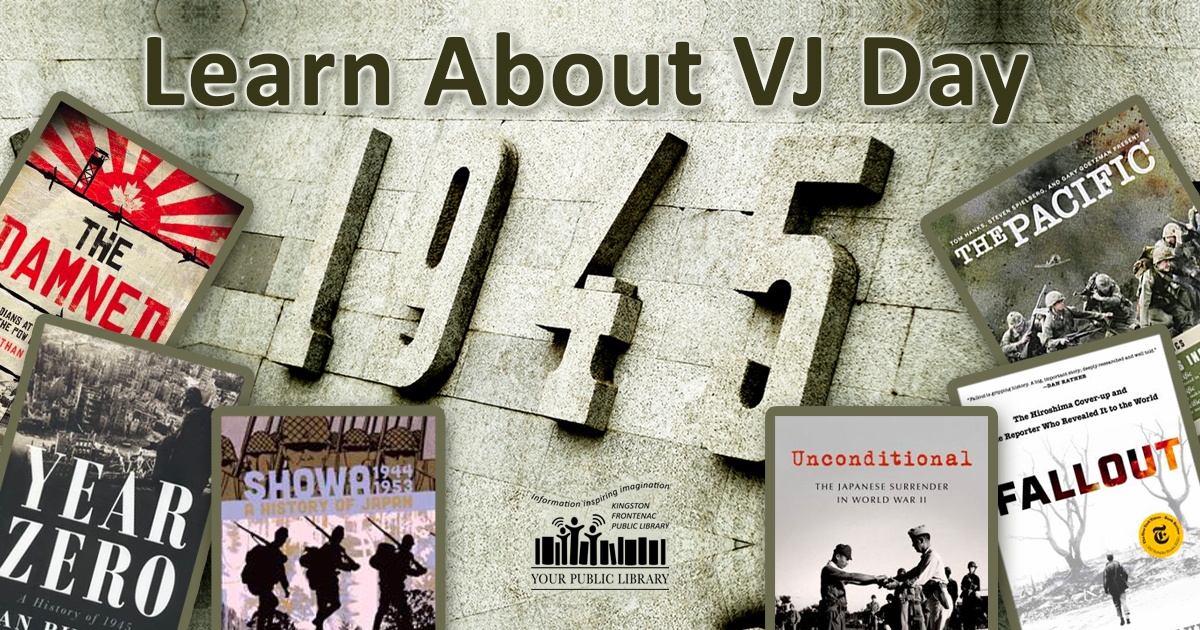
September 2 is Victory Over Japan Day (VJ Day). Following the atomic devastation at Hiroshima and Nagasaki, Japan announced its surrender on August 15, 1945, and signed the formal surrender document on September 2. VJ Day marks the official end of World War II, the most cataclysmic conflict in human history. Learn more about this pivotal event's era by exploring KFPL's related titles.
Unconditional: The Japanese Surrender in World War II by Marc S. Gallicchio
A new look at the drama behind the war's end in the Pacific. Japanese and Allied leaders signed the instrument of surrender that formally ended WWII on September 2, 1945, aboard the American battleship USS Missouri in Tokyo Bay. Behind it lay a debate that had been raging for some weeks prior among American military and political leaders.
Embracing Defeat: Japan in the Wake of World War II by John W. Dower
Drawing on a vast range of Japanese sources and illustrated with dozens of astonishing documentary photographs, Embracing Defeat is a complete history of the more than six years of American occupation, which affected every level of Japanese society, often in ways neither side could anticipate.
The Damned by Nathan M. Greenfield
The Damned tells the largely unknown saga of Canada’s first land battle of the Second World War, fought in the hills and valleys of Hong Kong in December 1941, and the terrible years the survivors of the fight spent as slave labourers for the Empire of Japan.
Year Zero: A History of 1945 by Ian Buruma
A history of the pivotal year 1945 as a new world emerged from the ruins of World War II. One world had ended, and a new, uncertain one was beginning.
Countdown 1945: The Extraordinary Story of the Atomic Bomb and the 116 Days that Changed the World by Chris Wallace and Mitch Weiss
After years of bloody conflict in Europe and the Pacific, America is stunned by the news of President Franklin D. Roosevelt's death. In an instant, Vice President Harry Truman, who has been kept out of war planning and knows nothing of the top-secret Manhattan Project to develop the world's first atomic bomb, must assume command of a nation at war on multiple continents and confront one of the most consequential decisions in history.
Bomb: The Race to Build and Steal the World's Most Dangerous Weapon by Steve Sheinkin
In December of 1938, a chemist in a German laboratory made a shocking discovery: a uranium atom split in two when placed next to radioactive material. This is the story of the plotting, the risk-taking, the deceit, and the genius that created the world's most formidable weapon. This is the story of the atomic bomb.
Showa, 1944-1953: A History of Japan by Shigeru Mizuki and Zack Davisson
The third volume of the Showa series recounts the events of the final years of the Pacific War and the consequences of the war's devastation. After the surprise attack at Pearl Harbor, Japan and the United States were officially at war. The two rival navies engaged in a deadly game of feint and thrust, waging a series of micro-wars across the tiny Pacific islands. From Guadalcanal to Okinawa, Japan slowly loses ground. Finally, the United States unleashes the death blow with a new and terrible weapon — the atomic bomb.
Fallout: The Hiroshima Cover-up and the Reporter Who Revealed it to the World by Lesley M.M. Blume
Just days after the United States decimated Hiroshima and Nagasaki with nuclear bombs, the US government and military had begun a secret propaganda campaign to hide the devastating nature of these experimental weapons. The cover-up intensified as occupation forces closed the atomic cities to Allied reporters, preventing leaks about the horrific long-term effects of radiation which would kill thousands during the months after the blast. For nearly a year, the cover-up worked until New Yorker journalist John Hersey got into Hiroshima and managed to report the truth to the world.
Tower of Skulls by Richard B. Frank
Tower of Skulls is the first work in any language to present a unified account of the course and titanic impact of this part of the global war, which began the torturous route to twenty-first-century Asia. It expands beyond military elements to highlight the war's critical political, economic, and social repercussions.
The Pacific, directed by James Podeswa
The Pacific tracks the real-life journeys of three U.S. Marines across the vast canvas of the Pacific theatre in WWII, from their first battle with the Japanese on Guadalcanal, through the rainforests of Cape Gloucester and the strongholds of Peleliu, across the bloody sands of Iwo Jima, through the horror of Okinawa, and finally to their triumphant but uneasy return home after VJ Day.















